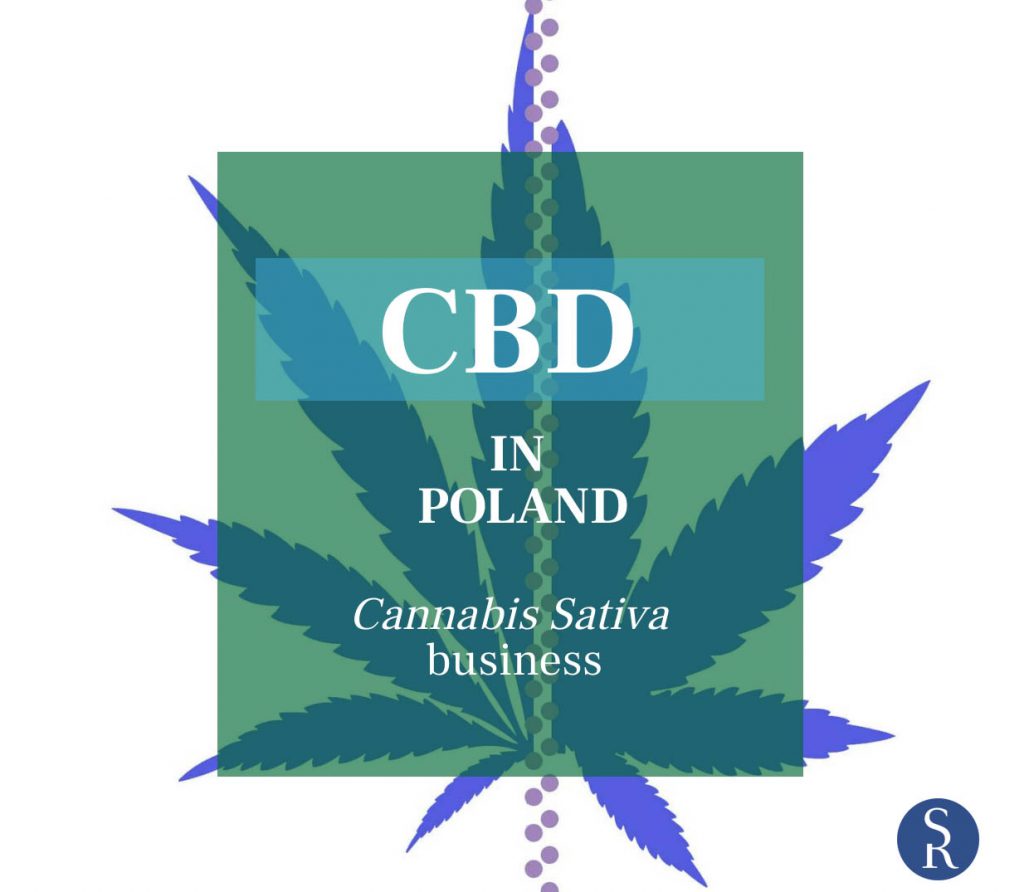CBD in Poland regulations
Due to the recent popularity of hemp based products, there are more and more companies in Poland representing various branches of the CBD and Cannabis Sativa industry. Recently, we have received multiple inquiries from foreign investors planning to set up business of CBD based products in Poland. Cannanbidiol situation in Poland is very complex and requires to consider every branch of this business separately.
Legal status of Cannabis in Poland
Hemp (Cannabis) is the collective name of plants in the cannabis family. Their division into species such as Indica or Sativa is matter of discussion, but usually these two species are generally distinguished.
Cannabis Sativa, which is officially called fibrous hemp, true hemp or simply industrial hemp is plant produced for fibrous material or cannabidiol (CBD) substance.
On the other hand, Cannabis Indica is hemp contains a high concentration of psychoactive substances, cause hallucinogenic effects and is treated as an illegal substance in Poland.
Chemicals found in cannabis are called cannabinoids. We can divide them into:
- psychoactive compound THC (tetrahydrocannabidiol)
- and CBD, which does not presents psychoactive properties (cannabidiol).
Above mentioned substances are found in both species of hemp, but in a completely different concentration. According to Polish law, for a plant to meet safety standards, the THC content may not exceed 0.2%. Such a negligible amount of psychoactive compound does not cause adverse effects even when consuming a large amount of the product.
Main types of CBD business in Poland
Business activity connected with Cannabis Sativa and CBD is growing very fast in Poland and concerns different levels of distribution and category of CBD products. Like every business it is difficult to make clear classification, however we can divine general types of cannabidiol business in Poland:
- Production, cultivation of Cannabis Sativa (fibrous hemp);
- Sourcing and merchandising of wholesale fibrous hemp;
- Processing fibrous hemp for food, beverages, diet supplements, medical products;
- Retail sale of hemp and CBD based products.
1. Production - cultivation of CBD-based hemp in Poland
Despite the widespread production and distribution of hemp-based products, it is illegal in Poland to grow plants for your own purposes. In Poland, the cultivation of hemp is only allowed for the needs of the textile, chemical, cellulose and paper, food, cosmetics, pharmaceutical, building materials and seed industries. Moreover production of hemp in Poland requires concession.
For concession to grow hemp in Poland may apply only entrepreneur or a natural person (farmer). Moreover granting concession for cultivation of CBD-based hemp in Poland requires meeting following conditions:
- applicant has to have clean criminal record for the offenses referred to in art. 63, 64 or 65 of the Polish Act on Counteracting Drug Addiction;
- hemp may be cultivated only in designated areas, on the basis of a permit for cultivation, using seed of the elite or certified category;
- cultivation contract is required to conclude with an entity authorized by the Regional Marshal to purchase hemp;
- technical and infrastructure measures ensure proper security against use of hemp for unlawful purposes.
Cultivation of CBD hemp in Poland is the subject to control. If the Polish Authority recognizes that it is conducted contrary to the provisions of the regulation (e.g. on a different surface, using other seed or without the required cultivation contracts), entrepreneur may receive an order to destroy crops on his cost (e.g. by plowing, digging the ground or otherwise). You will have to execute the mandatory destruction immediately. It is very important to keep records of purchase invoices and labels from the seeds.
The Polish Authority will withdraw concession if it finds that you have violated the conditions of business activity set out in the regulation on counteracting drug addiction or in the permit.
Penalties for illegal cultivation:
- Illegal Cultivation of fibrous hemp is penalized with a fine;
- Cultivation hemp other than fibrous hemp (Cannabis Sativa) is subject to the penalty of imprisonment up to 3 years, and in the case of significant amounts from 6 months to 8 years.
2. Sourcing and merchandising of wholesale fibrous hemp in Poland
As in the case of production CBD-based hemp, sourcing (purchasing) unprocessed hemp in Poland requires concession.
The permit includes the right to purchase fiber hemp collections, including the acquisition from entities authorized to cultivate.
A form of cooperation with the entity authorized to cultivate and harvest is a cultivation contract – an obligation to purchase whole or just part of the harvest. The presentation of such a contract for the collection of fibrous hemp is one of the conditions for obtaining a purchasing hemp permit in Poland.
3. Processing fibrous hemp for food, beverages, diet supplements, medical products in Poland
Processing fibrous hemp may be performed only by entities stipulated in point 1 or 2 e.i. which have concession to cultivate or purchase Cannabis Sativa. These entrepreneurs have to notify Regional Marshal about plans to process of hemp in Poland and present technical and infrastructure resources.
Next step depends on final product resulting from processing of fibrous hemp. As It was outlined at the beginning , Cannabis Sativa may be processed in Poland only for the needs of the textile, chemical, cellulose and paper, food, cosmetics, pharmaceutical, building materials and seed industries.
For example, if you are planning to process fibrous hemp to food product, your business activity in Poland has to fulfill all requirements for food-processing establishments – it has to be entered in the Register of Establishments subject to the official control of authorities of the State Sanitary Inspection.
4. Retail sale of hemp and CBD based products
The types and variety of CBD based products in Poland are very wide. We can distinguish among others food products, beverages, diet supplements, oils, dried hemp, medical products, cosmetics etc.
Above mentioned CBD based products has to be classify generally in Poland as food products of non-animal origin. Therefore, the scope of business activity which is connected with retail sale of CBD-based products to customers in Poland is regulated as every activity of retail sale of food products.
According to Polish Act of Food and Nutrition Safety the entity is obliged to submit an application for entry in the Polish Register of Establishments Subject to Official Control of the Bodies of the State Sanitary Inspection. The application should be submitted to the competent State Sanitary Inspector within 14 days before the start of the planned activity. Failure to submit an application maybe penalized by a fine of PLN 1000 to 5000.
It is very important that CBD-based products be labeled and identifiable by appropriate means in Poland. Labeling must meet the requirements of the Polish Act on food and Nutrition Safety, the Polish Regulation of the Minister of Health on the Composition and Labeling of Dietary Supplements, the Polish Regulation of the Minister of Agriculture and Rural Development on the Labeling of Foodstuffs, the Regulation (EC) No. 1924/2006 of the European Parliament and of the Council of December 20, 2006 on nutrition and health claims related to food and Commission Regulation (EU) No 432/2012 of 16 May 2012 establishing a list of permitted food health claims, other than claims referring to the reduction of disease risk and the development and health of children.
In addition, in accordance with Article 29 of the Polish Act on Food and Nutrition Safety, in order to monitor products placed on the market in the Republic of Poland, a food business operator placing product on the market for the first time, including dietary supplements, is obliged to notify the Chief Sanitary Inspector about the placing on the market of a particular foodstuff, indicating its name and manufacturer, while presenting a model of its labeling in Polish. The Chief Sanitary Inspector conducting explanatory proceedings may require the entity to submit relevant documents, e.g. the opinion of a scientific unit or the opinion of the Office for Registration of Medicinal Products, Medical Devices and Biocide Products that a given product does not meet the requirements of a medicinal product.
Furthermore, Polish Food and Nutrition Commission has issued opinion regarding CBD-based products on 27th May 2019. Following to above mentioned document:
- According to the European Commission, some Cannabis Sativa hemp seed products, such as seeds, seed oil, hemp seed flour, defatted hemp seeds have a consumption history before May 15, 1997 and should not be treated as novel food (novel food). Also in the country, these products were traditionally used as food in some regions. Other food products obtained from Cannabis Sativa hemp, due to the lack of information on the history of safe consumption, should not be placed on the market without following the procedure specified in Regulation (EU) 2015/2283 of the European Parliament and of the Council of 25 November 2015.
- The labeling of hemp seed products and the information accompanying the marketing of these products can not indicate therapeutic effects, including the presence of therapeutic compounds such as cannabidiol (CBD).
- If tetrahydrocannabinol (THC) is found in hemp seed products, it is necessary to always assess the risk, based on the acute reference dose (ARfD) adopted by EFSA, 1 µg delta-9-THC / kg bw.
- It should be noted that the safety of the food is the responsibility of the producer, so the Commission recommends that the requirements for THC contamination in the products listed in point 1 be implemented in the HACCP system.
- Due to the growing fashion for food products containing hemp (or products derived from it), it is necessary to undertake research aimed at implementing accredited analytical methods and monitoring levels of tetrahydrocannabinols and other cannabinoids in foodstuffs, including dietary supplements.
- The Polish Commission strongly emphasizes that the above position does not release from the obligation to comply with other legal provisions, including the Polish Act on Counteracting Drug Addiction.




